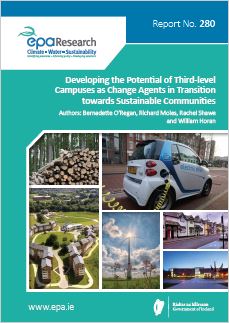Authors: Bernadette O’Regan, Richard Moles, Rachel Shawe and William Horan
Summary: In relation to experimentation with, and demonstration of, novel management approaches and technologies designed to enhance sustainability, higher education institution (HEI) campuses have been identified as ideal testing grounds, as they embrace a diverse population and act as a microcosm of wider society, and control space for demonstration projects.

Meeting current and urgent environmental challenges requires the active engagement of all possible sectors and organisations. Through an evaluation of a diverse set of national and international case studies, this research identified further opportunities to be exploited by Irish higher education institutes (HEIs) to greatly enhance campus sustainability. Both technological and management actions were included in the analysis. The significant extent of feasible actions in reducing material and energy consumption was demonstrated by calculating savings to be gained under three policy scenarios (business as usual, incremental change and step change) in relation to energy production and consumption, water use and transport. A second part of the research concerned the potential for HEIs to act as catalysts in moving wider society to greater sustainability. The case studies identified many feasible approaches that have been found to be successful, for example “living labs” and greater off-campus engagement with industry and business, communities and local authorities. These include dedicated on-campus structures (often termed “sustainability offices”) with the purpose of further facilitating researchers in all disciplines to share their expertise and knowledge with off-campus partners keen to learn how to make their communities more sustainable. From other EPA funded projects undertaken by the research team, it is clear that, with this help, actions taken by communities will be much more effective at delivering behavioural change.
The findings of this research demonstrate that there are very significant opportunities for enhancing existing policy when the potential of HEIs to act as catalysts is fully exploited. In relation to the Public Sector Energy Efficiency Action Plan, HEIs are required to reduce energy consumption by 33% by 2020. The findings from this research demonstrate the many ways in which this target can be met. The National Strategy for Higher Education to 2030 stipulates that engagement with the wider community ought to be a core mission of HEIs. Findings from this research identify and evaluate a wide range of feasible actions by HEIs that will encourage and facilitate communities to move towards greater sustainability. Our Sustainable Future: A Framework for Sustainable Development for Ireland calls for the evaluation of sustainable consumption patterns in energy, transport, food, planning and implementation, with HEIs to provide the skills and training necessary for a more sustainable society and economy. Findings from this research provide a blueprint for the deeper and wider engagement of HEIs in meeting these policy goals.
Evaluation of the environmental and socio-economic factors that either drive, or create barriers to, behavioural change allows identification of further opportunities for and models of action of the higher education sector. There is a clear need to create a system that allows for the identification and evaluation of campus environmental impacts, to create a baseline and allow verification of future improvements. This research report provides this, through the Higher Education Advancing Development for Sustainability (HEADS) framework. HEIs should build on existing structures to facilitate both on-campus and off-campus behavioural change. This report explores sustainability strategies; improvements in data collection, an assessment framework for monitoring, reporting and evaluation, and publication of data; the need for sustainability offices; and the role of teaching, outreach and research in developing greater sustainability. National and international case studies demonstrate the feasibility and value of these structures. Implementation of these will facilitate the HEI sector in realising its potential to drive campus and community sustainability. It should be noted that the research team does not support the idea of using data gathered to rank the success of HEIs: campuses differ in many ways, and such ranking is considered counter-productive. Governmental support through the Higher Education Authority and the Department of Education and Skills, and recognition of the full potential role of HEIs, will in turn aid the implementation of national policy. The report also identifies funding sources that have been exploited by Irish and other European HEIs.
https://www.epa.ie/media/epa-2020/publications/research/Research_280_Thumbnail[1].jpg